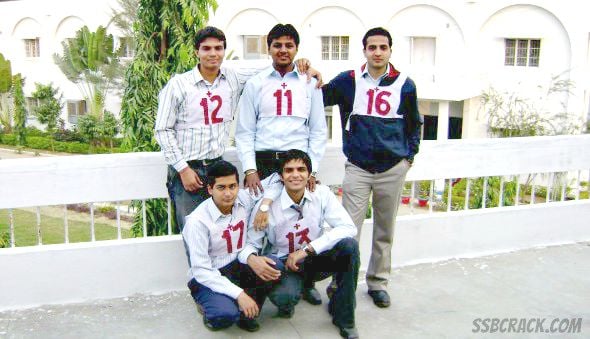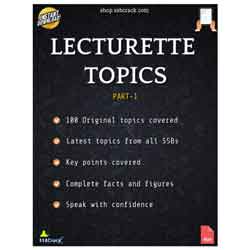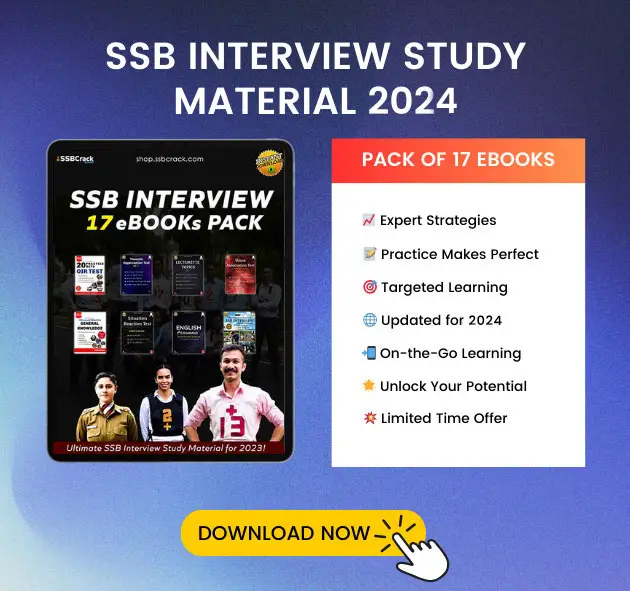Psychology is the study of human behavior. And SSB is all about knowing the psychology of the candidate. That is the reason, why every SSB board contains at least one psychologist. They want to know about you even without directly asking you and testing you in a way that only your true self emerges.
On a thorough talk with an AFSB psychologist from Varanasi, who incidentally turns out to be my friend’s father, I asked him how the assessors look at the candidate’s psychology while undergoing SSB testing. It turned out to be in my favor that I collected some amazing points on how the assessors are able to know who the candidate really is and understand how they perceive things.
So, here are some quick tips that help you in knowing someone, from a psychologist’s perspective:
- The theory of handshake: A person with a loose handshake lacks confidence & self-esteem. Not too firm and not too loose. Just the right. But hey, know when to initiate a handshake. The person in a higher position of authority or age should be the first one to extend a hand. So, if the interviewer extends a handshake, don’t deny it nor do initiate it. If you make a mistake and initiate it, don’t withdraw your hand because that would be rude. Always follow through with a handshake. Smile and continue with the introduction. Don’t apologize. Stand and look the other person in the eye before shaking hands. A firm handshake of 2-5 secs is recommended. Also, shake hands in an up-down motion. Not sideways. Greet during the handshake; e.g Say “good morning sir” while shaking hands and not after it.
- Act confident: Even if you don’t feel confident, act confident. The presence you bring to SSB interviews weighs more heavily than the content of the interview itself. When you come off as confident, authentic, passionate, comfortable, and enthusiastic, interviewers are more likely to recommend you. The psychologist says the best way to give off a confident presence is to “power pose” before the interview, i.e. stand in a posture of confidence, even when we don’t feel confident. It affects the chemicals in our brain and might even impact our chances for success.
- Mirror your interviewer’s body language: You’ve got to be likeable to make a good impression. One way to appear more likeable, trustworthy, and empathetic is by mirroring your interviewer. Mirroring or “mimicry” happens when you match another person’s expressions of nonverbal communication, like body language, gestures, vocal pitch and tone, posture, eye contact, and body orientation. While mirroring is often subconscious, you can certainly control it by paying attention to your interviewer’s nonverbals, especially his body language and tone of voice. But keep it very subtle, otherwise it might backfire. If you’re crossing and un-crossing your legs every time your interviewer does, he might get weirded out or see you as incompetent.
- Repeat Things Back: This is a communication strategy called “reflective listening,” and it happens in two parts: First, you listen and try to really understand what a person is saying. Then, you paraphrase what they said to confirm you understood and emphasize their point. Not only does reflective listening make you look and sound interested and intelligent, it’s also a form of flattery. Plus, having good listening skills is important for any SSB interview.
- Ask Questions: Pose questions if an interviewer asks for any questions at the end of the interview. But, avoid saying phrases like “Please recommend me”, “This is my nth interview, please be lineient”. This will have a negative affect on the interviewer. Ask questions like “What are the reasons, if any, for me to not get recommended”. Once the interviewer answers your question, clarify the reasons he stated. This will make you more likely to leave a good impression. At last, he told me about this awesome Oliver-Emberton test. I was really shocked by the results. Let me warn you to not read the interpretation before taking the test. This will spoil the test. Interviewers often ask candidates to imagine what they say and when they do, they are truly what they are-no chances of faking. You can also take this test on strangers to know about them. Here’s the test:
- Oliver-Emberton Test: Imagine a desert, as far as your eyes can see and this desert has a cube in it. Now describe this cube; it’s size, placement and dimensions. Now amidst that scene, you see a ladder. Describe everything about the ladder too. This entire picture will now have a horse too. Just like everything else, describe this too. Be thorough. The last thing that you will encounter is a storm. Think about a detailed description of the storm too.
Once you are done imagining, let me help you in opening the relevance of this quiz.
Warning: Don’t scroll below before taking the test
:
:
:

Interpretation:
The cube is yourself.
The size is ostensibly your ego: a large cube means you’re pretty sure of yourself, a small cube less so.The vertical placement of the cube is how grounded you are. Resting on the sand? You’re probably pretty down to earth. Floating in the sky? Your head is in the clouds.
The cube’s material conveys how open you are: transparent cubes belong to transparent people, opaque cubes are more protective of their minds. Glowing? You’re likely a positive person, who aims to raise the spirits of others. Made of granite? You’re likely protective and resilient.
The trick here is that when asked to describe a blank, abstract entity – a cube – your imagination will tend to project its own identity onto it. This trick is as old as time, but it’s about to get more interesting.
The ladder represents your friends.
Are your friends leaning on the cube? Your friends depend on you, and are close. Is the ladder frail, or robust? Tall or short? Does it lead inside the cube? Or is it cast to one side, lying unloved on the sand? By now you should be able to draw your own conclusions.
The horse represents your dream.
The type of horse reveals a lot about what you yearn for in your dream. Some people see a steady brown workhorse, others a shining pegasus or unicorn. Make of these people what you will.
Is your horse nuzzling your cube affectionately, or taking a bite out of it? Is it far from your cube, or walking away? This can represent a current dream, or an aspirational one, but the results are often a mix of touching and hilarious.
Finally, the storm represents a threat.
This speaks to the current state of the person, and how they perceive risk in their life. Some may see a distant storm, on the lip of the horizon, fading from sight. Others may view themselves in the midst of a thunderous apocalypse, hailstones the size of tennis balls pelting their fragile cube and horse. Chances are those people have some immediate trauma in their life.
So, now you know how you’re being assessed from a psychologist’s point of view, mould yourself accordingly. But remember, being determined, consistent and steady is the key to success.









Amazing dude, thanks a lot for giving this insight.